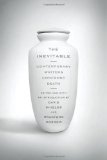Summary | Excerpt | Reviews | Beyond the Book | Readalikes | Genres & Themes | Author Bio

Contemporary Writers Confront Death
by David Shields, Bradford Morrow
Several essays eulogize mothers in particular; in our beginning is our end. The first half of Kyoko Mori’s “Between the Forest and the Well” evokes her mother’s suicide and evolves into a necessary meditation about the author herself, alone and childless, thinking about death. “Sometime in my forties,” she writes, “I came to admit the truth: the main problem with death isn’t dying but being dead. Much as I’m afraid of the process, the result is unimaginably worse. . . . I am afraid of death because I believe in nothing.” And yet Mori’s conclusion is stunning, invigorating: “My decision-making practice is the opposite of memento mori. . . . I try to choose as though I would have to live forever with the consequences, not as though I might die tomorrow. . . . In my reverse memento mori, I’ve learned to cheat death, if only in imagination and metaphor.” In “A Solemn Pleasure,” Melissa Pritchard evokes imagery of landscapes and graveyards far from home while addressing the recent death and cremation of her mother. “She was ash in my home now,” Pritchard writes, “powdered and tamped into a hideous shoe-polish-brown box, weighing little more than a feather.” Kevin Baker’s “Invitation to the Dance” describes the process by which he finds out that his mother has Huntington’s disease and then that he has inherited the gene for the disease: “I thought about how giddy I would have been feeling if the results had been negative. I felt like blurting out the news to anyone I encountered, I just found out I will get a fatal disease. But I didn’t. . . . What I really wanted was to live like I always did, taking little care of myself, wasting time worrying over politics, or how the Yankees were doing, or even the banality of other people’s opinions. . . . I wanted my trivialities.”
Many of these essays, such as Jonathan Safran Foer’s and Christopher Sorrentino’s, are highly pointillistic—death as content apparently pushing form toward a sort of scattering. In “A Primer for the Punctuation of Heart Disease,” Foer proposes a new way of punctuating dialogue to denote unspoken aspects and meanings in conversations within a family that has suffered forty-two heart attacks, while examining the family legacy marked by tragic losses in the concentration camps of World War II. In Sorrentino’s essay, the author makes an argument that digital proliferation—the attempt to leave a record of ourselves not so much in art as in various web presences—avails not as far as death is concerned. “Public mourning says, I am sad,” he writes. “Now show me the film.” Having made this case, he proceeds to offer a moving tribute to his recently deceased father, the writer Gilbert Sorrentino, weaving polemical with personal -thoughts.
Several essays resolve the issue of the difficulty of writing about death by coming at the subject from several angles simultaneously, working toward the subject of death through collage or in triptychs. (Why triptychs? Birth, life, death.) Diane Ackerman mourns the loss of a beloved friend in an intimate, moving passage that floats between two linguistic flights touching upon mortality and eternity. Greg Bottoms’s “Grace Street” is a gracefully understated triptych as well: three apparently unconnected scenes, all death-haunted, from his life fifteen years ago, when he was living in a down-and-out section of Richmond. In “Cézanne’s Colors,” Brenda Hillman writes about the deaths of three loved ones in an essay that gestures more overtly toward the mystical than most of the other essays in the book do: “The diagnosis for everyone is death, yet even in times of thinking about the afterlife, I’ve thought of being part of an endless system of metaphors.” Imagining consciousness as being like a bursting-with-life park near her house, in which the cycle of life and death endlessly flow, she concludes that existing knowingly within that vivid world is -sufficient.
Reprinted from The Inevitable, Contemporary Writers Confront Death edited by David Shields and Bradford Morrow (c) 2011 by David Shields and Bradford Morrow. Used with permission of the publisher, W. W. Norton & Company, Inc.
Your guide toexceptional books
BookBrowse seeks out and recommends the best in contemporary fiction and nonfiction—books that not only engage and entertain but also deepen our understanding of ourselves and the world around us.